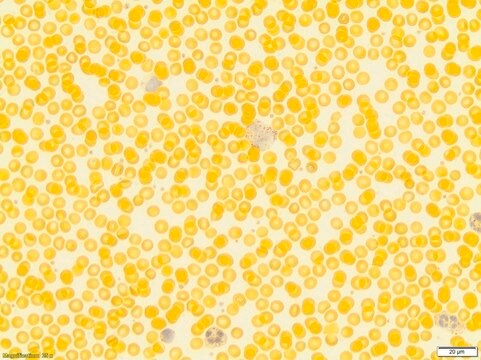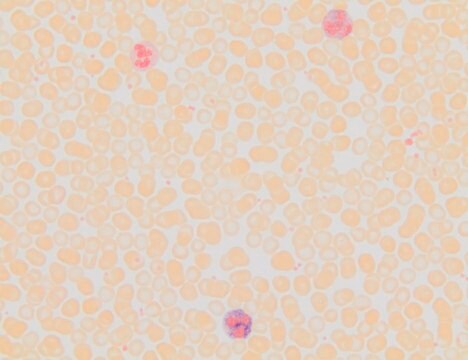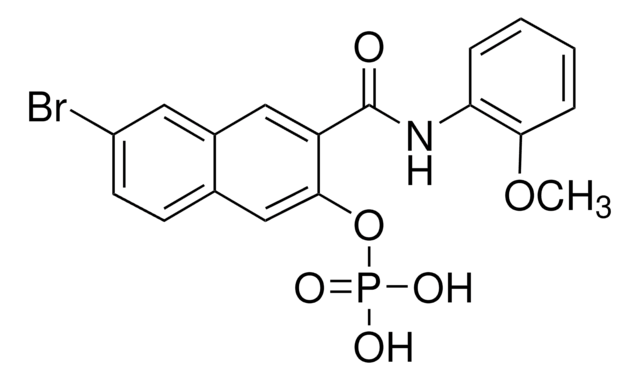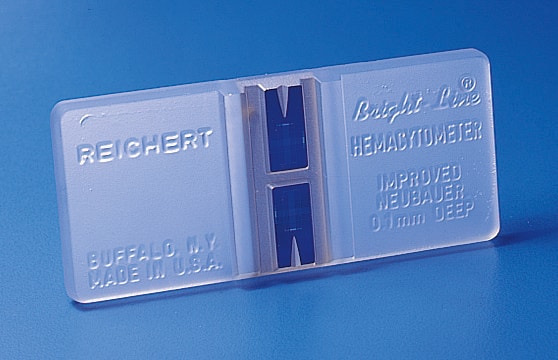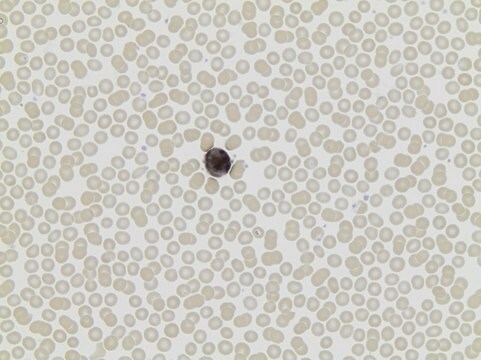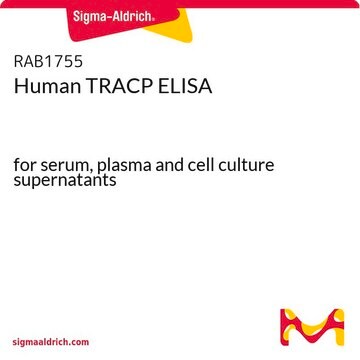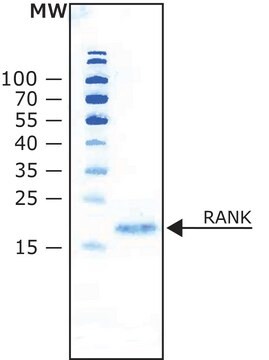387A
Leukocyte Acid Phosphatase (TRAP) Kit
Kit formulated with all liquid reagents
Sign Into View Organizational & Contract Pricing
All Photos(1)
About This Item
UNSPSC Code:
12352106
eCl@ss:
42010102
NACRES:
NA.47
Recommended Products
Quality Level
shelf life
Expiry date on the label.
IVD
for in vitro diagnostic use
dilution
(for histology)
application(s)
hematology
histology
shipped in
wet ice
storage temp.
2-8°C
Related Categories
Principle
Peripheral blood or bone marrow preparations are fixed to a microscope slide. The resulting film is incubated in a solution of Naphthol AS-BI phosphoric acid and freshly diazotized Fast Garnet GBC. Kit is used to demonstrate acid phosphatase and tartrate resistant acid phosphatase (TRAP) in blood, bone marrow and tissue touch preparations.
Kit Components Only
Product No.
Description
- Hematoxylin Solution, Gill No. 3 (kit only) 50 mL
Kit Components Also Available Separately
Product No.
Description
SDS
related product
Product No.
Description
Pricing
signalword
Danger
hcodes
Hazard Classifications
Acute Tox. 4 Oral - Carc. 1B - Eye Dam. 1 - Met. Corr. 1 - Skin Corr. 1B - STOT RE 2 Oral
target_organs
Kidney
Storage Class
6.1C - Combustible acute toxic Cat.3 / toxic compounds or compounds which causing chronic effects
wgk_germany
WGK 3
Choose from one of the most recent versions:
Certificates of Analysis (COA)
Lot/Batch Number
Don't see the Right Version?
If you require a particular version, you can look up a specific certificate by the Lot or Batch number.
Already Own This Product?
Find documentation for the products that you have recently purchased in the Document Library.
Customers Also Viewed
Yun Zhang et al.
Biological & pharmaceutical bulletin, 39(12), 2028-2035 (2016-12-03)
Osteolysis induced by chronic Gram-negative bacterial infection underlies many bone diseases such as osteomyelitis, septic arthritis, and periodontitis. Drugs that inhibit lipopolysaccharide (LPS)-induced osteolysis are critically needed for the prevention of bone destruction in infective bone diseases. In this study
Jihai Wang et al.
Frontiers in pharmacology, 9, 64-64 (2018-02-24)
Lipopolysaccharide (LPS) can induce bone loss by stimulating bone resorption. Natural compounds have great potential for the treatment of osteolytic bone diseases. Magnesium lithospermate B (MLB) plays an important role in protecting against oxidative damage and also has potential anti-inflammatory
Yu Wang et al.
Cellular physiology and biochemistry : international journal of experimental cellular physiology, biochemistry, and pharmacology, 47(6), 2291-2306 (2018-07-06)
Osteoporosis is a commonly occurring condition marked by a loss of bone density. Previous evidence has highlighted the roles played by microRNAs as potential treatment tools for the disease. At present, the influence of long non-coding RNAs (lncRNAs) on the
Isabella Azario et al.
Scientific reports, 7(1), 9473-9473 (2017-08-27)
Umbilical cord blood (UCB) is a promising source of stem cells to use in early haematopoietic stem cell transplantation (HSCT) approaches for several genetic diseases that can be diagnosed at birth. Mucopolysaccharidosis type I (MPS-I) is a progressive multi-system disorder caused
L Wei et al.
Osteoporosis international : a journal established as result of cooperation between the European Foundation for Osteoporosis and the National Osteoporosis Foundation of the USA, 25(8), 2089-2096 (2014-05-09)
Recently, the use of the pharmacological agent strontium ranelate has come to prominence for the treatment of osteoporosis. While much investigation is focused on preventing disease progression, here we fabricate strontium-containing scaffolds and show that they enhance bone defect healing
Our team of scientists has experience in all areas of research including Life Science, Material Science, Chemical Synthesis, Chromatography, Analytical and many others.
Contact Technical Service